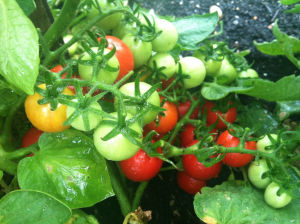by MADELEINE LIST, The Diamondback, February 20, 2013

Photo: Diana Daisey
Source: www.diamondbackonline.com
Most students have to rely on the dining halls or fast food options for food, but some will soon learn how to grow their own.
All it takes are the right tools and techniques and a little bit of guidance. And that’s where Melissa Avery steps in.
Last Tuesday, nearly 20 students gathered at the Apiary for the first in a series of winter workshops about gardening. The Arboretum and Botanical Garden and a collaboration of the university’s Community Gardens hosted the workshop, called Gardening 101. Avery, master gardener in training, instructed attendees on the basics of gardening, and answered questions from students about how to raise their own plants.
Because winter isn’t the season for planting, people interested in gardening have a few weeks before spring to learn the basics, said Yixin Chen, communications manager for the public health garden and sophomore nutritional science major.
“It’s a great way for people who are interested in gardening to realize, ‘Oh yeah, I can do this.’ Having that knowledge is a big first step,” she said.
Georgia Handforth, a co-manager at the Rooftop Community Garden and a senior communications and sociology major, said it’s beneficial for students to learn how to grow their own plants on the campus.
“Fresh herbs are fantastic,” she said. “But living on campus, people don’t really have space to plant a garden in their backyard because they don’t have a backyard.”
Students can grow certain types of plants even if they live in dorms or apartments, Avery said. Tomatoes grow well in this area and can even be grown in pots off a balcony, she said. And herbs such as basil and oregano can be grown in windowsills.
“I think it’s really, really important, especially nowadays, to know how to grow your own food, even if it’s just a little pot on your balcony or windowsill,” she said. “As time progresses, it will become more important to understand how to retain resources and take care of yourself.”
She also discussed the difference between warm and cool weather plants, and when to plant each type. Heartier vegetables like broccoli, chard and cauliflower can be planted sooner, she said, whereas warm-weather vegetables like eggplants, tomatoes and green peppers should be planted later.
Other themes in the workshop included composting, temperature zones, organic pest control and rain barrels, a topic that may be the focus of the next workshop, Avery said.
Rain barrels are an efficient and inexpensive way to water a garden without wasting resources, she said. She hopes to spend the next workshop constructing actual rain barrels with students and teaching them how to use them effectively.
A date has not yet been set for the next workshop, Chen said, but she hopes to make them bi-weekly events.
Avery is a volunteer and has taught other workshops in the past, said Carin Celebuski, coordinator of volunteers for the Arboretum and Botanical Garden. She also has a table at the campus farmer’s market, where she answers questions about plants and gardening, Celebuski said.
Avery said she is studying to become a master gardener through the Extension Office at the university. Volunteering is part of the credit needed to receive her certification, and she must complete 20 volunteer hours each year to maintain her status as master gardener. Avery said she plans to continue teaching the workshops even after she has completed her volunteer hours.What do you think?
There are four student-led vegetable gardens on the campus: the Public Health Garden between the Eppley Recreation Center and the public health school; the Rooftop Garden South located on the third-floor roof of the South Campus Dining Hall; Am Ha’Aretz Garden, a Jewish environmental club that has a garden on Hillel property; and the St. Mary’s Garden on the east side of St. Mary’s Language House, Celebuski said.
Though the clubs are separate, they are working to collaborate on more events and projects such as seed exchanges, she said.
Not only is gardening beneficial for students’ health, but food and herbs that are hand-grown provide an added kick, Chen said.
“It makes everything taste better when you grow it yourself,” she said. “It cannot get any more local than your own garden.”